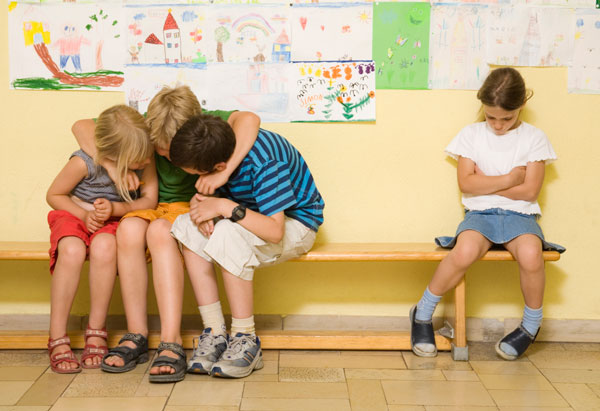That Left-Out Feeling
Insert knife. Twist gently to the left. Judith Sills, PhD, examines the painful business of being excluded and leaves nothing out.

Photo: Thinkstock
Last New Year's Eve my friends planned to gather for a couples pajama party. The richest member of our circle had just bought a really swell beach house—completely winterized—so everyone would be down and comfy amidst all the material splendor that four bedrooms, three fireplaces, and a full frontal display of the bay can provide. It was to be a grand party, and its only shortcoming was that I was not invited.
Ah, just like me to take that omission too personally, as a girlfriend of mine pointed out. Actually, neither my husband nor I was invited, so it's not as if I were singled out. I felt singled out, however—singled out, left out, and knifed in the back.
My husband found this a remarkably passionate reaction to a missed pajama party, even one involving three fireplaces and "Auld Lang Syne." But he is socially tone-deaf and I am a Geiger counter.
For a while I dripped my furiously hurt feelings onto the shoulders of some of the lucky invitees, people I thought of as close friends. Seeing me in pain, they unanimously distanced themselves. They were powerless, they explained. Not in charge of the guest list. Felt bad themselves, but these things happen. We can't all be invited everywhere, now can we? Take it like a grown-up.
But being left out is not an inherently grown-up phenomenon. It is a grade-school agony that recurs throughout life. Being left out is an emotional drama that unfolds in three acts: discovery, distress, and, if you can get there, detachment. These psychological rhythms prevail whether you are reeling from the whispers of a group of girls at recess or excluded from a bridge game in your assisted-living home. Being left out is the dark side of friendship, and most of us have been both victims and perpetrators.
In my most recent experience as a victim, I moved beyond my ineffective initial outcry to the common fallback—retreat. I withdrew to brood and waited to see which of my friends would care enough to inquire further about my feelings. Several did, which launched our entire friendship group into the emotionally absorbing business of speculating on motive.
I cannot say for sure how many phone calls were required to establish cause; as the victim, I missed the juiciest speculations as to how I had given offense. Eventually, the group consensus was reported to me. I had likely insulted the party host, went the theory. I had been a confidante of his wife during a time of their marital upheaval, and she had probably reported my criticisms of him. When the now reconciled host and hostess conferred on the guest list, my omission was one of the new things on which they could agree.
Ah, just like me to take that omission too personally, as a girlfriend of mine pointed out. Actually, neither my husband nor I was invited, so it's not as if I were singled out. I felt singled out, however—singled out, left out, and knifed in the back.
My husband found this a remarkably passionate reaction to a missed pajama party, even one involving three fireplaces and "Auld Lang Syne." But he is socially tone-deaf and I am a Geiger counter.
For a while I dripped my furiously hurt feelings onto the shoulders of some of the lucky invitees, people I thought of as close friends. Seeing me in pain, they unanimously distanced themselves. They were powerless, they explained. Not in charge of the guest list. Felt bad themselves, but these things happen. We can't all be invited everywhere, now can we? Take it like a grown-up.
But being left out is not an inherently grown-up phenomenon. It is a grade-school agony that recurs throughout life. Being left out is an emotional drama that unfolds in three acts: discovery, distress, and, if you can get there, detachment. These psychological rhythms prevail whether you are reeling from the whispers of a group of girls at recess or excluded from a bridge game in your assisted-living home. Being left out is the dark side of friendship, and most of us have been both victims and perpetrators.
In my most recent experience as a victim, I moved beyond my ineffective initial outcry to the common fallback—retreat. I withdrew to brood and waited to see which of my friends would care enough to inquire further about my feelings. Several did, which launched our entire friendship group into the emotionally absorbing business of speculating on motive.
I cannot say for sure how many phone calls were required to establish cause; as the victim, I missed the juiciest speculations as to how I had given offense. Eventually, the group consensus was reported to me. I had likely insulted the party host, went the theory. I had been a confidante of his wife during a time of their marital upheaval, and she had probably reported my criticisms of him. When the now reconciled host and hostess conferred on the guest list, my omission was one of the new things on which they could agree.



